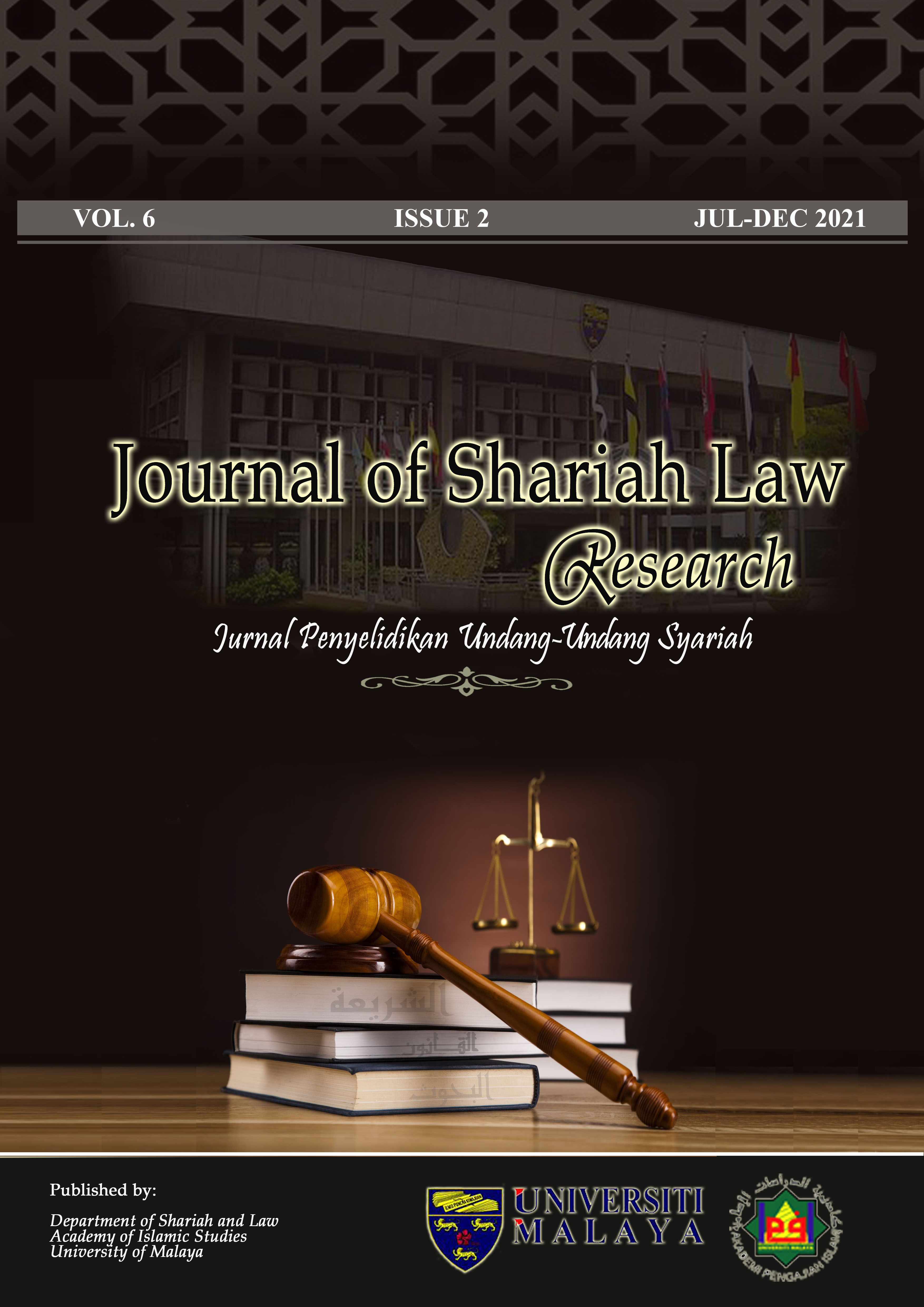AN OVERVIEW OF THE INHERITANCE LEGAL SYSTEM IN MALAYSIA AND INDONESIA: ISSUES FACED BY BOTH COUNTRIES
DOI:
https://doi.org/10.22452/jslr.vol6no2.3Abstract
The practice of inheritance, both civil and Islamic, has always been subjected to various laws and regulations and involves the participation from relevant institutions as well as the family of the deceased. Since religion and culture do not exist in isolation, it has been observed in both Malaysia and Indonesia that the practice of inheritance involves various legal systems such as civil law, Islamic law as well as customary practices. Due to the application of various laws, there can exist the issue of conflict of jurisdiction between the three legal authorities. These difficulties are further exacerbated when variant laws and customs exist in certain communities and are tightly held on to by certain individuals, especially those who lack the legal and procedural knowledge of inheritance. This situation leads to adverse implications such as difficulties in the distribution of estate, determination of status of heirs as well as impending disputes among the family members. This paper therefore seeks to examine the legal system involving inheritance and its practices in Malaysia and Indonesia. Through doctrinal research, it has been found that both Malaysia and Indonesia share similar factors which had attributed to inheritances; First, there is a lack of knowledge among the beneficiaries and second, the court’s decision in upholding priority over civil rights. This paper is based primarily on the analysis of secondary sources such as journals, conference papers, textbooks, statutes, case laws, and other library-based documents. The findings of this study show that a cohesive approach needs to be spearheaded by the government in educating the society on the law of inheritance. Legal reforms in terms of the jurisdiction of the judiciary will also serve as an ideal solution over the revolving inheritance issues in both nations.
Downloads
References
Akhmad Haries (2014). “Analisis Tentang Studi Komparatif Antara Hukum Kewarisan Islam dan Hukum Kewarisan Adat,” Jurnal Fenomena, vol. 6, no. 2, 217-230.
Akmal Hidayah Halim (2012). Administration of Estates in Malaysia, Law and Procedure. Subang Jaya: Sweet & Maxwell Asia.
Alma’mun, S. (2010). “Islamic Estate Planning: Analysing the Malaysian perceptions on Wasiyyah (Will) And bequest practices.” Doctoral dissertation, Durham University.
Fatin Afiqah Md Azmi & Mohammad Tahir Sabit Mohammad (2011). “The causes of unclaimed, late claimed or distributed estates of deceased Muslims in Malaysia.” Paper presented, International Conference on Sociality and Economics Development.
Hazairin (1982). Hukum Kewarisan Bilateral menurut Al-Qur’an dan Hadist. Jakarta: Tintamas
Kompilasi Hukum Islam Indonesia. (1983). Book II-Inheritance Law, Chapter One, General Provisions, Article 174 Paragraph 2.
Kumoro, R. Youdhea S. (2017). “Hak dan Kedudukan Anak Luar Nikah dalam Pewarisan menurut KUHPerdata,” Lex Crimen, vol. 6, no. 2.
M. Toha Abdurrahman (1976). Pembahasan Waris dan Wasiat Menurut Hukum Islam. Yogyakarta: t.p.
Maharani, Dhea Swasti & Diana Tantri Cahyaningsih (2018). “Akibat Hukum Anak Yang Berbeda Agama Dengan Orang Tua Ditinjau Menurut Hukum Waris di Indonesia: Studi Kasus Putusan Mahkamah Agung Nomor 1582 K/Pdt/2012,” Jurnal Privat Law, vol. 6, no. 1, 197-207.
Miszairi Sitiris & Akmal Hidayah Halim (2010). “Tuntutan Harta Sepencarian dalam Kes Kematian,” KANUN: Jurnal Undang-Undang Malaysia, vol. 22, no. 1, 26-46.
Mohammad Yasir Fauzi (2016). “Legislasi Hukum Kewarisan di Indonesia,” Jurnal Pengembangan Masyarakat Islam, vol. 9, no. 2, 53-76.
Muhammad Ridhwan Ab Aziz, Mohammad Noorizzuddin Nooh, Khairil Faizal Khairi, Fuadah Johari & Azrul Azlan Iskandar Mirza (2014). “A Review on Literatures in Planning and Managing of Islamic Wealth Distribution (2001-2013),” Library Philosophy and Practice (e-journal). Paper, 1144.
Nasrul Hisyam Nor Muhamad & Norazila Mat Hussain (2014). “Pembahagian Harta Pusaka Felda: Perspektif Masyarakat Islam Felda Taib Andak,” Sains Humanika, vol. 66, no. 1, 27-33.
Noraini Noordin, Adibah Shuib, Mohammad Zainol & Mohamed Adil (2012). “Review on Issues and Challenges in Islamic Inheritance Distribution in Malaysia,” OIDA International Journal of Sustainable Development, vol. 3, no. 12, 27-38.
Richards, Paul, & Leslie B. Curzon (2011). Longman Dictionary of Law. n.d.: Pearson Higher Ed.
Sari Pusvita (2018). “Keperdataan Anak di Luar Nikah dalam Putusan Mahkamah Konstitusi dan Implikasinya Terhadap Harta Warisan,” Ulul Albab: Jurnal Studi dan Penelitian Hukum Islam, vol. 1, no. 2, 31-51.
Sarmadi, A. S. (2016). “Hukum Waris Islam di Indonesia (Perbandingan Kompilasi Hukum Islam dan Fiqh Sunni),” http://www. aswajapressindo. co. id/.
Sudarsono (1991). Hukum Waris dan Sistem Bilateral. Jakarta: Rineka Cipta.
Surini Ahlan Sjarif & Nurul Elmiyah (2005). Hukum Kewarisan BW Pewarisan Menurut Undang-Undang. Depok: Badan Penerbit Fakultas Hukum Universitas Indonesia.
Tolib Setiady (2009). Intisari Hukum Adat Indonesia. Bandung: Alfabeta.
Yusuf Somawinata (2009). “Hukum Kewarisan dalam Kompilasi Hukum Islam (KHI) di Indonesia,” Jurnal al-Qalam, vol. 26, no. 1, 129-149.
Zulkifli Mohamad, Johari Talib & Ruzman Md Noor (2011). “Issues of land inheritance from Felda settler’s perspective: A case study among settlers in Lurah Bilut, Bentong, Malaysia”.
Downloads
Published
How to Cite
Issue
Section
License

This work is licensed under a Creative Commons Attribution-NonCommercial 4.0 International License.








